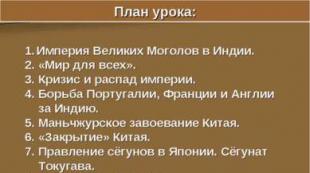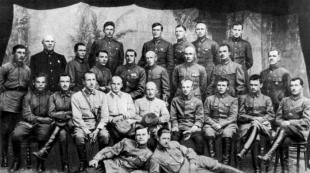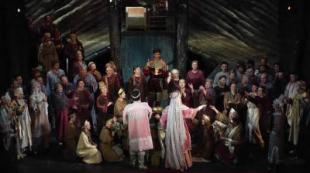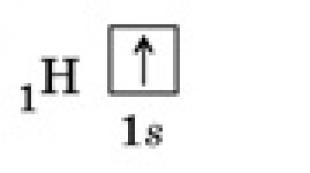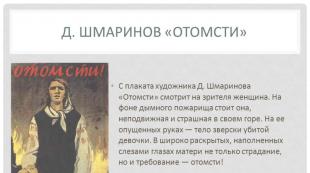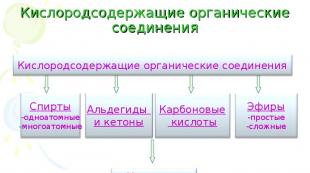What's new in the exam. Unified State Examination: compulsory subjects for passing the exam. Deadlines and tasks
It is necessary to carefully monitor changes in the Unified State Exam options: if you do not pay attention to a new criterion or type of task, this will lead to an unfortunate loss of points. We have collected everything new in the Unified State Exam so that graduates know what to prepare for in 2019.
Russian language
What's new?
- Added new task No. 21
- Changed the format of tasks No. 2, 9-12
- Increasing scores on criterion K2 and changing criterion K4 in an essay
- For task No. 1, a maximum of one point is given instead of two.
- Task No. 20 now goes under item No. 6
New task No. 21
It tests the ability to conduct punctuation analysis of a text, that is, explain which punctuation mark needs to be placed and why. It involves searching for constructions with commas, colons and dashes in the proposed text. 1 point is given for a correct solution. The numbers of correct answers can be indicated in any order; their number is limited only by the number of sentences.
In the demo version of the exam, new task No. 21 looks like this:
It is important to pay attention to the task, because graduates consistently perform poorly on punctuation tasks. Most often, problems arise with the rules on the topics “Punctuation in sentences with introductory constructions”, “Punctuation in sentences with homogeneous members”, “Punctuation in complex sentences consisting of several parts”.
Task No. 2
The task has become more complicated; there are no more answer options to choose from. Instead of choosing a word from the proposed list to fill the gap, you will have to select it yourself. The task tests the ability to identify relationships between sentences and use means of communication between them.
Tasks No. 9-12
The changes affected the form of completing the task: instead of writing out words with missing letters, you need to choose the answer option with a number.
On the one hand, it has become simpler - you don’t need to write out a whole word, on the other hand, it has become more complicated, because there can be more than one answer options.
Composition
Now, when writing an essay according to criterion K2 “Commentary on the formulated problem of the source text,” they give 5 points instead of 3.
To get all 5 points you need to:
- Comment on the author’s position based on the source text
- Give 2 example illustrations from the text that are important for understanding the problem
- Explain both examples
- Identify semantic connections between examples
- Avoid factual errors related to understanding the problem of the text. For example, if the text raises the problem of creating a reputation, you should not talk about the categories of good and evil
The K4 evaluation criterion has changed. Now there is no need to give arguments from life experience or literary works. Instead of 3 points, they give 1. For the criterion to be counted, it is necessary to express your attitude towards the author’s position, agreeing with him or not, and justify your answer.
Literature
There are no plans for significant changes in the structure and content of the Unified State Examination in literature.
What's new?
The criteria for verification and evaluation in assignments have been clarified:
- No. 8 and 15 - the wording in K1 and the calculation of errors in K2 have been clarified.
- No. 9 and 16 - options for shortcomings in answers have been added to K1 and K2.
- No. 17.1–17.4 in K4 added calculation of logical errors.
Tasks 8 and 15
The point “The answer is meaningfully related to the task” was replaced with “the answer to the question is given”; the essence of the criterion has not changed - the text must be understood correctly, and the author’s position must not be distorted.
Factual errors are taken into account more strictly: if two or more are made, 0 points are given according to the second criterion, 1 point if one error is made, and a maximum of 2 points if there are no errors.
Tasks 9 and 16
These tasks test how well a graduate can compare a proposed work of art with another from the school curriculum. Here, according to the first criterion, you can get a maximum of 2 points if the work is named, the author is indicated, it is compared with the proposed text in a given direction, the position of the author of the work is determined correctly.
The main changes concern what you can get 1 point for: this year it is permissible to compare works in a formal manner, that is, simply repeat the wording of the task.
Tasks 17.1–17.4
In the evaluation criteria, it was clarified for how many logical errors points are reduced. So 0 errors is 3 points according to the criterion, 1-2 errors - 2 points, 3-4 errors - 1 point, more than 4 errors - 0.
Social science
There are no plans for global changes in the structure and content of the Unified State Exam test materials in social studies in 2019.
What's new?
- Assignment No. 25 - the wording of the assignment has been clarified and the assessment system has been changed. The maximum score has been increased from 3 to 4.
- Tasks No. 28, 29 - the wording was clarified, the assessment systems were improved.
- Maximum primary score increased from 64 to 65.
Task No. 25
Unlike last year, the current answer to the task must contain at least three sentences:
- sentences or several sentences revealing the meaning of the concept from the task,
- information about three types of disciplinary sanctions from the social studies course,
- proposals that reveal the essence of the principle of humanism of legal responsibility.
The concept is assessed separately, with a maximum of 2 points; for two other aspects - the proposal - they are also given a maximum of 2 points. If the definition in the first sentence is incorrect, then the second part of the lesson will not be assessed at all.
The answer is not:
- repeat a concept whose meaning must be revealed;
- indicate a feature that is already contained in the wording of the task;
- explain the meaning of a concept through negation, metaphor, allegory;
- use language that distorts the meaning of the concept or its individual aspects;
- use reasoning of everyday rather than social science nature;
- use unused sentences.
Task No. 28
In this task, it is necessary to draw up a complex plan that will reveal the stated topic. As last year, the plan must contain at least three points, but now at least two of them must be described in detail.
To get the maximum score on an assignment:
- the answer must be given in the form of a plan, other forms: text, diagram, table are unacceptable;
- it is necessary to draw up a plan of at least three points;
- at least two points must be described in subparagraphs;
- the plan should cover the topic based on social science knowledge.
Task No. 29
In the task you need to choose one of the proposed statements and write a mini-essay based on it.
This year the wording of the task has been changed:
- In the text of the assignment, instead of the word “problem,” “the main idea of the topic raised by the author” is used - this is done so that graduates do not look for or invent a problem, but focus on the meaning of the statement.
- Expand the idea of the statement based on social science knowledge (concepts and theoretical positions).
- To illustrate, use two or more examples from different sources: public life, media reports; personal experience, including reading and viewing from other academic subjects. Examples should not be of the same type!
The evaluation criteria have become clearer; now it is impossible to get through with an essay that uses phrases and judgments at the everyday level. The main change affected criterion 29.3: now a maximum of 1 point is given for it. Its meaning is that reasoning and conclusions must be consistent, consistent, justified and reliable from the point of view of scientific social science.
Story
What's new?
- In task No. 21, a new requirement for the preparation of the answer has been added, and the criteria for its evaluation have been supplemented.
A clause has been added to the text of the assignment: “When answering, avoid quoting redundant text that does not contain provisions that must be given according to the terms of the assignment.” This is due to the fact that graduates often quoted large chunks of the text given in the assignment. Now, if the answer contains unnecessary information, it will not be counted.
Biology
What's new?
- Task No. 2 has been replaced. Added work with a table instead of a task with multiple choice of the correct answer. Now instead of 2 points they give 1.
- Added variants of the problem on genetics in the form of task No. 6. Here it will be necessary to analyze the pedigree and determine the genotype of the descendant according to the scheme.
- The maximum primary score has decreased by 1 and will be 58 points.
Foreign language
What's new?
- The wording and evaluation criteria for task No. 40 - essay writing - have been clarified. The same thing for which many graduates received 0 points this year.
Now in task No. 40 there are two statements to choose from; graduates must choose only one and write a detailed essay according to plan:
- in the introduction, identify the problem by paraphrasing the selected statement;
- express a personal opinion and present 2-3 arguments in support of it;
- express an opposing opinion and give 1-2 arguments in its favor;
- explain why you disagree with the opposing opinion;
- write a conclusion where you reaffirm your opinion.
The topic of the Unified State Exam worries not only graduates, but also their parents and teachers. Work is constantly underway on this system of testing the knowledge of graduates; innovations in the Unified State Exam do not stop and many adjustments are being made. And, of course, you need to study the latest Unified State Exam 2018 news in advance so that you know what to prepare for and not worry.
A couple of years ago there were a lot of rumors about the Unified State Exam in 2018: some wanted to cancel it, others wanted to increase the number of compulsory subjects to six. Schoolchildren complain about the clichéd nature of assignments and the lack of opportunity to show their best sides. Universities are faced with the problem of silent students because students are taught to memorize material and mark the correct option. Therefore, the already famous phrase “forget everything you were taught at school” has a place in universities. It is not yet known for certain how the Unified State Exam will change its appearance in the coming years.
News from 16.03.2018 . State Duma deputies will introduce a bill to abolish the Unified State Exam. This information was received from Boris Chernyshov, deputy chairman of the State Duma Committee on Education and Science, co-author of the bill.
But everyone who hoped for the cancellation of the Unified State Exam in 2018 will not be happy. The Ministry of Education and Science does not support such an initiative and states that it is premature to talk about canceling the Unified State Exam.
Unified State Examination News 2018
There is a new Minister of Education in power, not Dmitry Litvinov, who planned to increase the number of subjects to six by 2018. Vasilyeva, who holds the position of minister, is a supporter of gradual changes, she said that the project to reform the Unified State Examination will continue, but there is no need to be afraid of global changes.
So what changes will there be in the Unified State Exam 2018?
- The number of compulsory disciplines may change.
- One more subject will be added to the existing twelve – Chinese language.
- Mark for the final essay.
- Changes in the structure of CMM options.
- Tightening of examination measures.
- The influence of the exam result on the score in the certificate.
Let's take a closer look at these new provisions.
What compulsory subjects are included in the Unified State Exam 2018?

The number of compulsory exams for grade 11 is constantly changing. Previously, the question “how many subjects should be taken” did not arise among eleventh-graders. The following were and are necessary:
- Russian language, consisting of two parts;
- mathematics (since 2015, divided: profile - for those entering technical specialties; basic - for those entering humanitarian specialties).
To obtain a more necessary certificate than a certificate, these two exams must be passed with a positive mark.
The issue of a third compulsory subject has been under consideration for a long time; it is possible that at the end of this academic year, children will have to take three compulsory disciplines.
Candidates for the 2018 mandatory exams vary, but the leaders are as follows:
- History - even V.V. Putin spoke out in defense of this subject;
- Social studies is the most popular discipline;
- A foreign language in the age of globalization is gaining many supporters;
- Geography is included here for the same reason.
Disputes are ongoing, and accurate information will only be given at the beginning of the school year.
Choose and submit!
Elective subjects are called that because graduates choose them themselves, based on what subjects are required for admission to the desired university. The number of additional disciplines to pass is not limited. Therefore, what to take for the Unified State Exam and how many subjects to take is up to you to decide. There are 12 elective disciplines:
- Humanities: history, social studies, literature
Languages: English, German, French, Spanish.
- Technical sciences: physics, chemistry, biology, computer science and ICT.
In 2018, Chinese was added to the list of elective disciplines.
What innovations will affect the final essay?
The latest news reports that marks will now be given for the final essay. If previously there was only pass/fail, now a five-point scale is used to evaluate essays. The evaluation criteria can be viewed on the FIPI website. You remember that when you apply for an essay, points are added? This could be your ticket to a coveted place at the institute.
Another news: instead of three essay topics, five will now be offered. There is a chance to choose a more interesting or simple one for yourself. But with an increase in the number of topics, the required volume also increases - 250 words instead of 200. Reformers are trying to achieve competent written speech from schoolchildren in this way. The hope that schoolchildren will at least read a few books for the exam does not die.
Tests are removed, creativity is added
Yes, yes, this is exactly what experts were guided by when creating new Unified State Exam KIMs in literature. Assignments with short answers are eliminated, and the length of the essay increases. This discipline is subject to much controversy and is most often subject to reform.
Changes in the Unified State Exam in 2018 also apply to other disciplines. Test tasks that require a simple choice among these options are gradually being removed. There are tasks of medium and high complexity. Exams in biology and social studies were left without a test part; the examinee must himself give a short answer to the question posed. In this way, it is planned to improve the quality of education in the disciplines.
The oral portion of the exam on The Great and Mighty will be coming soon, but don't worry, not this school year. But the point is that the association of the Unified State Exam with a test, where you can tick boxes at random, is being actively removed.
There is also news for those taking computer science: the Unified State Exam will be taken on computers.
Metal detectors didn't help, we'll have to install jammers
According to numerous surveys and studies, many schoolchildren manage to pass exams in the classroom. Cameras, metal detectors, threats, orders from teachers - none of the above stops students. It’s still possible to walk through with a phone and even use it. Therefore, starting from 2018, it is planned to install mobile communication jammers. Rosobrnadzor is determined to tighten measures in the preparation of options and their delivery; approach observers and teachers even more seriously to avoid the possibility of cheating.
Unified State Examination and certificate
Changes in the Unified State Exam also affected the scoring of the certificate. The mark can be either improved or damaged. But there is an advantage to this. For example, you have studied Russian all your life with a solid “4”, and suddenly you write an exam with an “excellent”. Most likely, the teacher will meet you halfway and give you an “A” on your certificate. But we all understand that, in the end, only the teacher decides what mark to give you on your certificate.
Now you know what changes will be in the Unified State Exam 2018 and you can try to use them to your advantage. More detailed information about what the Unified State Exam will be like in 2018 and about innovations in the Unified State Exam will appear in the fall.
When is the exam in 2018?
The exams take place in several stages:
Early
Basic
| May 28 | Geography, Computer Science and ICT |
| May 30 | mathematics (basic level) |
| June 1st | mathematics (profile level) |
| June 4) | history, chemistry |
| June 6 | Russian language |
| the 9th of June | foreign languages (oral) |
| June 13 | foreign languages (oral) |
| June 14 | social science |
| June 18 | biology, foreign languages (written) |
| June 20 | literature, physics |
| 22nd of June | reserve: geography, computer science and ICT |
| June 25 | reserve: mathematics (basic and specialized levels) |
| June 26 | reserve: Russian language |
| 27th of June | reserve: biology, foreign languages (written), history, chemistry, |
| June 28 | reserve: literature, social studies, physics |
| June 29 | reserve: foreign languages (oral) |
| July 2 | reserve: for all subjects |
Additional
| 4 September | Russian language |
| September 7 | mathematics (basic level) |
| September 15th | reserve: mathematics (basic level), Russian language |
How many points should I get in 2018 to get admitted?
To get a certificate, not a certificate, you will need one number of points, and to enter a university another. These two concepts should be distinguished, since the numbers may vary. Every year the “minimum scores” change, depending on how well people pass the test across the country. Therefore, today we can only give approximate Unified State Exam scores:
- mathematics – 27;
- Russian language - 36;
- physics, chemistry, biology – 36;
- history, literature – 32;
- geography – 37;
- computer science and ICT – 40;
- social studies – 42;
- foreign languages - 22.
To obtain a certificate you must have the following number of points:
- Russian language – 24;
- mathematics – 27, or a basic level of 3.
But, if we compare these figures, it becomes obvious that the doors to universities are closed to those who simply sought to somehow obtain a certificate.
…
All students who have entered the 11th grade can only be advised not to hope that the Unified State Exam will be suddenly canceled in 2018, but to take into account the changes in the Unified State Exam in 2018 and get ready to pass. Many leading figures believe that it is this exam that helps young people from the hinterlands make their way to the country's leading universities. If this is so, then the Unified State Exam is live!
The FIPI website already has options for all disciplines. If you are prepared, no changes will affect your results! Good luck!
Final exams are getting closer, which means it’s time to figure out how things are going with passing them this year. The current academic year has generally pleased us with a large number of innovations. For example, the Ministry of Education and Science proposed an educational standard for education and adopted a declaration on education. In general, they created a lot of resonant reasons for discussion. The procedure for conducting the unified state examination also did not go unnoticed. What changes await graduates of 2018, what you need to know and what to prepare for. Let's figure it out.
Photo tumblr.com
Olympiad winners are required to confirm benefits with high scores
Back in September, Education Minister Olga Vasilyeva spoke about corruption in the field of school Olympiads. According to statistics, 40% of last year’s Olympiad participants were unable to confirm their knowledge with Unified State Exam scores (did not score more than 60 points in core subjects).
In this regard, at a meeting of the Federation Council Committee on Science, it was decided that the benefit for a budget place applies only if at least 75 points are scored for the Unified State Exam in the subject of the Olympiad.
Moreover, by decree of the minister, the list of preferential Olympiads was reduced to 97.
“Golden” medals must be confirmed by Unified State Exam scores
The medal “for special merit” is awarded to graduates who graduate from school with only “A” grades. Universities, in turn, have the right to add from 1 to 10 additional points to the total amount. In this regard, the Ministry of Education also found corruption in the area of issuing medals. Unfortunately, statistics confirm this. The consequence of this was the initiative of Rosobrnadzor to issue medals only to those who receive the equivalent of an “A” in state exams.
The bill will come into force in 2019, so this year’s graduates will receive their awards regardless of passing the Unified State Exam.
New forms
The format of this year's question paper is also different from previous years. According to representatives of the ministry, this was done in order to optimize the process, increase safety and save money. Moreover, all materials, including forms, will be printed directly in the PPE.
Competition for target
Targets were also not left unattended. Due to the fact that any applicant can enter into an agreement with a company for training in a targeted area, the overall Unified State Examination score for those admitted to this program is quite low. As you know, target students take budget places, some with insufficient points. In this regard, the Ministry of Education and Science is considering a project according to which a competition will be announced for the target, similar to the competition for budget places.
But at the moment there are no official legislative acts on this topic.
Photo tumblr.com
Expanding the list of required subjects
This year’s graduates will definitely not be affected by the innovation, but the next generations should pay attention. The Minister of Education officially announced that in 2020 all graduates will be required to take the Unified State Exam in history, and in 2022 - in a foreign language.
Admission Procedure for College Graduates
In 2018, a bill came into force allowing universities to admit college graduates based on the Unified State Exam. That is, now the selection committee can choose what to be guided by - the Unified State Exam or internal exams.
Just like graduates themselves can choose the form of certification.
Workout for state employees
On April 12, 2018, the network was struck by the news that the Duma was preparing a bill obliging all graduates of budget education to work for 4.5 or 6 years (depending on the level of higher education) in a state organization. At the moment, this is at the proposal level, but future graduates are noticeably tense, since Sergei Vostretsov, the author of the idea, is a member of the United Russia party and has a Duma majority.
Bonus points for applicants with children
The Ministry of Education and Science plans to reward young mothers under 23 with bonus points when applying to universities. The bill will come into force no earlier than 2019. Based on the latest news, graduates of 2018 have nothing particularly to worry about; most of the innovations will not make fundamental changes to the system of passing the unified state exam.
Compulsory subjects - mathematics and the Russian language - have been used as a form of state final certification of general secondary education for a number of years. Conducting final certification has general rules that have been subject to changes several times. The latest changes to the general rules will be discussed in this article.
About the rules
The Unified State Exam (compulsory subjects and elective subjects) is carried out using control measuring materials (CMM), which are standard form complexes with tasks. In addition, there are special mandatory forms for filling out answers to assignments. Compulsory USE subjects, as well as elective subjects, are accepted in Russian in writing, unless this is a section of foreign languages (“speaking”).
Exams are held in Russia and abroad according to a single schedule. The organizers are Rosobrnadzor and the executive authorities of those constituent entities of the Russian Federation that manage the education sector (EI). Outside the country, the Unified State Exam (compulsory subjects and elective subjects) is also accepted by Rosobrnadzor and the founders of educational organizations of the Russian Federation, which are located abroad, have state accreditation and implement educational programs of general secondary education, as well as foreign institutions of the Ministry of Foreign Affairs of the Russian Federation, which have structural specialized educational units.
Admission to the Unified State Exam
Compulsory subjects and elective subjects are taken by students who do not have academic debt and have completed individual or general assessments in full with grades in all subjects for all years of study not lower than satisfactory.
Disabled children and people with disabilities, as well as students with limited health capabilities, studying in closed educational institutions and institutions where they are serving sentences of imprisonment, have the right to take the state final certification in the form of the Unified State Examination (Russian language and mathematics).
Students in educational programs of vocational secondary education also have the right to certification in the Unified State Examination form (Russian language and mathematics, as well as elective subjects for admission to a higher educational institution). Students in educational organizations of the Republic of Crimea and the city of Sevastopol have the same right.

Recertification and external training
The right to certification in the Unified State Examination form is available to graduates of previous years (with a document confirming receipt of general secondary education before 2013), as well as to those students who are mastering educational programs of vocational secondary education and studying in educational organizations abroad of the Russian Federation, even if they have There are valid Unified State Exam results from past years.
People who have completed secondary education programs in other forms - family education or self-education, or who have completed educational programs not accredited by the state can also take the Unified State Exam. They can pass the State Examination as an external student
Items
Currently, the required subjects for passing the Unified State Exam are Russian language and mathematics. However, changes and additions are planned for 2020. Firstly, according to the head of the Ministry of Education and Science Olga Vasilyeva, a history exam will be mandatory for everyone. In addition, the compulsory subjects of the Unified State Exam in 2020 may include a foreign language and geography. Indeed, without knowledge of history, the country will not be able to successfully move into tomorrow. Will geography be a compulsory subject of the Unified State Exam for now, since the entire existing examination system will be revised.
However, English will most likely be a compulsory subject in the Unified State Examination (or another foreign language). A number of regions will take this subject in testing mode in 2020. Further, by 2022, the country will be ready to include a foreign language in the examination minimum in schools, and now trial tests are being compiled and programs are being developed. History as a compulsory subject in the Unified State Examination is an issue that has already been practically resolved, although this will happen, according to Olga Vasilyeva, no earlier than 2020. This will be the third required subject.

History with geography
Olga Vasilyeva made many statements at the All-Russian Conference on the History of Russia, which was held in February 2017, regarding the development of education in the country. Much has been said about passing the Unified State Exam in 2020. Required items will be replenished. She clarified that today children only take mathematics and the Russian language, but the third subject of the Unified State Examination should certainly be history.
She also stated that she was listening carefully to the increasingly louder public opinion regarding the GIA, which students take after finishing the ninth grade, in geography. Many citizens are advocating for the introduction of such an exam at school graduation. The list of compulsory Unified State Exam subjects will definitely be replenished. Perhaps geography will be one of them.
For admission to university
In 2009, all school graduates received information about the compulsory Unified State Examination subjects. They were the Russian language and mathematics. At the same time, every eleventh grader must receive a score not lower than that established by Rosobrnadzor. Additionally, school graduates independently select several required subjects to enroll in a university. You need to choose from the list of general education disciplines that are included in the Unified State Examination list. How many compulsory subjects, for example, should an eleventh grader who is planning to enter university take? This will depend on the chosen specialization. For example, a future programmer needs ICT and computer science.
Unified State Examination tasks in mathematics can be completed in advance not only in full, but also repeatedly; for this, there are official portals with open problem banks. Since this subject is compulsory, graduates do just that. But mathematics is different from mathematics. The same future programmers should not solve the basic option, but the profile one. Unified State Examination tasks in profile-level mathematics require, however, only knowledge of the school course. The website of the chosen university probably has free demo material that you can use for self-study.

List
Subjects, including compulsory ones, chosen by a school graduate for admission to a university:
1. Russian language.
2. Profile and basic mathematics.
4. Physics.
5. Social studies.
6. History.
7. Information and communication technologies and computer science.
8. Geography.
9. Biology.
10. Literature.
11. Foreign language (English, French, German, Spanish).
To obtain a high school diploma, you need to take only two compulsory subjects - Russian language and mathematics. Further, on a voluntary basis, the graduate can take any subjects of his own choice in accordance with the requirements of a certain one. Everything depends on the planned direction of training, that is, the specialty.

Changes
Since the country is undergoing not too rapid, but dramatic changes, this cannot but affect the education system. The Ministry of Education and Science has accumulated a lot of complaints from the country's population. Of course, this examination system has its advantages, such as the option to prevent corruption and the independence of the knowledge assessment obtained. But there are also a lot of disadvantages. It is planned to develop a mechanism for passing the Unified State Exam in six subjects by 2019, as well as to increase the number of primary school certifications. Of course, knowledge must be assessed systematically so that students acquire skills that increase responsibility and order.
Both parents and teachers point out the testing nature of the exam as a disadvantage of the existing Unified State Examination organization. Most students are simply trying to guess the correct answer. This system should have been abolished a long time ago, replaced by a survey form that existed until 2009. Of course, both rehearsals and public opinion polls are necessary before anything new is introduced into this system, because, first of all, it is necessary to understand how much each of these changes will improve the situation.
Deadlines and tasks
Conducting the Unified State Exam on the territory of the Russian Federation, as well as outside it, provides for a unified schedule. Each academic subject has its own exam duration. In January of this year, the Ministry of Education and Science of the Russian Federation issues a decree approving a unified schedule and duration of each exam. It also provides the entire list of tools that will be needed for training and education and will be used when conducting the Unified State Exam.
FIPI (Federal Institute of Pedagogical Measurements) develops examination tasks (KIM), that is, sets of standardized tasks with the help of which the level of mastery of the educational standard will be established. On the FIPI website you can familiarize yourself in advance with the section of demonstration versions of the Unified State Examination for each subject, as well as with the documents that regulate the content and structure of KIM - with all codifiers and specifications. Assignments can have either extended or short answers. Oral answers of examinees in foreign languages are recorded using audio media. This section (“speaking”) is still on a voluntary basis.

Responsibility
Information about control measuring materials that are used to carry out state certification cannot be disclosed, since it is classified as information with limited access. Therefore, everyone who will be involved in conducting the Unified State Exam, as well as persons taking the exam during the period of its conduct, are responsible for the disclosure of KIM information in accordance with the legislation of the Russian Federation.
If KIM information is published, for example, on the Internet, this will become evidence of the presence of signs of an offense under Articles 13.14 and 19.30 of the Code of the Russian Federation on Administrative Offenses; 59, part 11 of the Federal Law of the Russian Federation "On Education in the Russian Federation".
results
The state final certification, which is carried out in the Unified State Examination form, uses a hundred-point grading system in all subjects except basic-level mathematics. Separately, for each subject, a minimum number of points is established, and if the examinee has overcome this threshold, then his or her mastery of the general secondary level educational program will be confirmed.
When the examination of examination papers is completed, the results of the Unified State Examination in all subjects are reviewed by the chairman of the State Examination Committee, after which he makes a decision to cancel, change or approve them. The results are approved within one working day after checking all examination papers.
Appeals
If a high school graduate being examined is not satisfied with the scores received, he has the opportunity to file an appeal of disagreement within two days from the date of announcement of the Unified State Examination results. It is drawn up in writing and submitted to the educational organization that granted admission to the examinee for the Unified State Exam.
Graduates of previous years and other categories of Unified State Exam participants can submit an appeal to the place of registration for the exam or to others determined by the region. The Unified State Exam results for each examinee exist only in the federal information system, and paper certificates about them are not provided. Their validity period is four years.

Retake
If a graduate of a given current year receives a result that is below the established minimum score in any of the required subjects, he can take the Unified State Exam again - the unified schedule provides for additional deadlines for this. If a USE participant of any category fails to obtain the minimum points in the subjects that he chose for admission to the university, then the retake will take place only after a year.
Since 2015, all schoolchildren can take the Unified State Exam in compulsory subjects up to three times (this only applies to mathematics and the Russian language). This is possible either on additional days if only one subject is failed, or in the fall (September, October). In the latter case, admission to a university cannot take place, since the required deadlines have passed, but the student will receive a certificate.
All teachers, graduates and, of course, parents are concerned about one question - do FIPI plan to introduce another innovation in the Unified State Exam and what should 11th grade students who graduate in 2019 prepare for?
The topic of the Unified State Exam is incredibly relevant. The attitude towards the final assessment on the part of children and parents is ambiguous, because often getting a high score in the subjects required for admission turns out to be quite difficult. And the first step in the effective preparation algorithm should be familiarization with the new requirements that will be relevant in the 2018-2019 academic year.
Cancellation of the Unified State Exam
Since the moment the final certification became mandatory for all graduates, news periodically appears that the Unified State Examination may be cancelled. But, despite all the efforts of initiative groups actively promoting the idea of canceling exams, this will definitely not happen in 2019.
The experience of reducing the number of compulsory subjects at the OGE has shown that the level of knowledge of ninth-graders in disciplines not included in the list of subjects for the exam has rapidly fallen. As a result, the number of compulsory subjects was returned and increased every year, thus motivating students to take the learning process more seriously.
Naturally, the government, Rosobrnadzor and FIPI will not agree to such experiments with 11th graders and the Unified State Examination in 2019, despite a number of high-profile scandals that many graduates and teachers remembered for the last 2018-2019 academic year.

Number of items in 2019
Discussions about the need to increase the number of compulsory subjects have been haunting graduates for many years now. If in 2018 only the Russian language and mathematics were compulsory, then in 2019 those taking the Unified State Exam might need to urgently brush up on history and English, although such innovations were again postponed, at least until next 2020.
The main subjects are still Mathematics and Russian language.
Among the elective subjects, the main innovation could be the holding of a pilot Unified State Examination in the Chinese language. Many 11th graders could have preferred this subject in the 2018-2019 academic year. Due to the fact that the Unified State Exam could be held in the format of a trial project, they could count on a more lenient assessment system than in exams in other foreign languages.

It is worth noting that the Unified State Examination assessment system in English could also be revised, because it was this subject that caused the maximum number of problems and negative reviews from graduates in 2018.
Changes in CMMs
In the process of reforming the knowledge quality control system, by 2018, FIPI had brought almost all KIMs in compulsory and optional subjects to the desired form. In a live broadcast on the Rossiya 24 TV channel, the Count of Rosbornadzor, Sergei Kravtsov, assured everyone that there are no plans to make any significant changes to the structure of the 2019 KIMs.
At the same time, it was previously said that already in 2019, all graduates will take the computer science certification exclusively in front of a computer monitor, and it is not yet known whether this new decision will affect the content of the tasks in the direction of reducing theoretical questions and increasing the volume of practical tasks.

- mathematics (both levels);
- physics;
- chemistry;
- geography;
- Informatics.
In tickets for other disciplines there will be more insignificant innovations developed taking into account the analysis of the 2018 Unified State Examination.
Russian language
In 2019, students will have to complete 1 more building in the 3.5 hours allotted for work. There will be 27 of them in the new CMMs (instead of 26 in 2018). New for students will be task No. 21 on punctuation analysis of text in oral form.
Among other innovations it is worth noting the following:
- The range of tested skills and abilities of students has been somewhat expanded;
- the format of tasks No. 2,9,10,11 and 12 has been changed;
- the difficulty level of tasks has been redistributed;
- The wording and assessment criteria for the new 27 task (with a detailed answer) have been clarified.
Foreign languages
The structure and content of the KIMs remain the same, but there are slight changes in the written part. In task “40” of the “Writing” block, the wording of the question itself has been changed, and the criteria for assessing the answer have also been revised.

Story
And in task No. 2 you need to fill out the specified table yourself instead of choosing 2 answer options out of 5, as was before.
Social science
In the 2019 KIMs, changes will affect tasks No. 25, 28 and 29, for which a new, more detailed formulation and a number of new assessment criteria will be proposed.
The maximum primary score will also increase. In 2019, when completing work in social studies, a graduate will be able to score 65 initial points, since when assessing assignment 25, it will now be possible to receive not 3 but 4 points.

Biology
The main innovation of the subject is the reduction of the maximum primary score from 59 (in 2018) to 58 (in 2019), which was the result of a change in the 2nd line assignment model. If previously the examinee was offered a multiple choice task worth a maximum of 2 points, now it will be work with a table for which one can receive 1 primary test point.
Task No. 6 will be presented not in text format, but in the form of a picture.
When preparing for other subjects, collections of tests, trial tasks and codifiers from last season, which can be found and downloaded on the official FIPI website (fipi.ru), will be quite relevant.
Expected innovations
Although no innovations are expected in the main subjects, there will still be something new in the 2019 Unified State Examination.
News No. 1
Rosobrnadzor plans to radically change the format of checking examination papers by integrating a cross-system. This means that the students’ work will be checked by experts from a completely different region of the Russian Federation. At the same time, teachers will not even know in which region, in which locality, and even more so, in which educational institution this work was written. Such a decision should completely eliminate the possibility of falsification of results.
News No. 2
In the near future, the Unified State Exam will become mandatory for graduates of secondary vocational education (colleges)!
For many years, students who did not master the curriculum very well were given the opportunity to bypass the Unified State Exam by entering college after the 9th grade and, after graduating from secondary vocational education, entering the 2nd year of the university without passing a single exam. Rosobrnadzor considered this state of affairs unfair and decided that the Unified State Exam should become mandatory for all applicants, regardless of which educational institution they graduated from. Thus, it is likely that already in 2019, graduates of secondary vocational education will be offered to pass mandatory exams in the Russian language and mathematics to continue their studies at the university.

News No. 3
Finalization of foreign language assignments. Although FIPI assures that all tickets are compiled in accordance with the subject study program, many schoolchildren, having a good grade in English, were unable to cope with the task. Thus, in 2018, many media outlets reported on the scandal that erupted due to the fact that thousands of graduates of Tula schools received “0 points” for an essay in a foreign language.
News No. 4
Unified State Exam for teachers of Moscow schools!
Do you think that any teacher can cope with Unified State Examination tasks without any problems? But in vain. Many teachers who have been teaching the subject to children for years are unable to show a level above average. And that's a fact. That is why Isaac Kalina believes that every teacher who wants to work in a Moscow school must confirm his level by passing the Unified State Exam with at least a grade of “4”.
News No. 5
Rosobrnadzor plans to eliminate the human factor by completely switching to electronic verification of USE and OGE work. Of course, this innovation will require serious preparation, which is simply unrealistic to implement by the start of the 2019 Unified State Exam. But by 2030, instead of experts checking compositions, essays and solutions to complex problems, there will be a complex intellectual program, the development of which is already underway.

